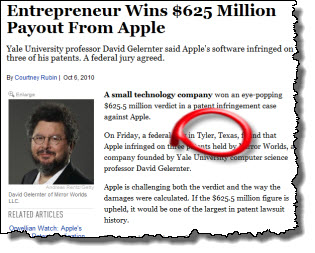What a shame. Although we all like neatly packaged stories — heroes and villains, good vs. evil, David vs. Goliath — it’s rarely that simple.
For example, late last year there was what seemed to be a great David vs. Goliath story about this inventor guy who teaches at Yale getting $625 million from Apple Computer for violating his patents.  Or so it seemed to me, that is, until I read that this happened in Tyler, Texas. The world capital of patent trolls.
Or so it seemed to me, that is, until I read that this happened in Tyler, Texas. The world capital of patent trolls.
What’s up with that? Well you might want to read Apple Don’t Go to Court in Tyler, Texas from back in 2008. Or better yet, this description published last year by Tyler Directory, a local publication:
What happens is a company buys up some patents that they already know are being infringed upon with the express purpose of making income through litigation. These patent trolls do not wish to make something with the patent they bought but are looking to sue as many large corporations as they can.
This patent trolling makes millions and millions of dollars for these companies as well as their lawyers. Not only does the patent troll need to open up a business in Tyler or East Texas to pursue litigation here but their lawyer must be local counsel.
In this case, I’m afraid, whatever the merits of the case, the David took the Goliath to a drastically slanted playing field. You could read this 2006 piece in TechDirt on the same phenomenon. East Texas loves patent trolls.
The inventor in this case, David Gelernter, seems easy to like. He says it’s not about the money …
Before the verdict was announced Gelernter spoke to the blog BigThink about the case: “[It’s] not because of the money, but because of the deliberate failure to acknowledge work that we would have made freely available as academics. …. We’d like to see credit where credit is due.”
It all sounds good to me. Except then he went and set up an office in East Texas, pretty damn far from Yale, to sue in East Texas patent troll heaven.
But wait — is he wrong to do what optimizes his chances to win? After all, if I owned a patent, and I wanted payback from a large company, I’d go to East Texas with it too. I’d do what makes me most likely to win. But I’ve seem some horrifically unreasonable patent troll lawsuits win money. That, in my opinion, is money for nothing. And I assume the lawyers get huge chunks of it too. It seems ugly.
But things are never that simple.




Comments
[…] permeates conventional knowledge, as casual observers
(such as Tim Berry) use phrases like “drastically slanted
playing field” to describe the district. I
don’t fault Berry for having this perception, and he did
[…]
Tim,
Regarding your comment: “the David took the Goliath to a drastically slanted playing field.”
First, assuming this is true, doesn’t this basically make David v Goliath a “pick ’em” fight?
Second, I don’t buy in to the “slanted” playing field argument. True, there was a time when plaintiffs won an astonishing 80% of the time, but that information is outdated. (Source: PWC 2007 Patent Litigation Survey) By 2010, however, the cumulative win rate had fallen to 55%. (Source: PWC 2010 Patent Litigation Survey). In order for the win rate to fall so drastically, the years between 2007 and 2010 saw a dramatic rise in defense verdicts. As things stand right now, most court watchers agree that the last couple of years have seen a mostly even ratio of plaintiff to defendant wins.
Patrick, thanks for that … and to other readers, Patrick suggested for me the following two links…
1.) http://www.pwc.com/en_US/us/forensic-services/publications/assets/2007-patent-study.pdf
2.) http://www.pwc.com/us/en/forensic-services/publications/assets/2010-patent-litigation-study.pdf
… that show the percent of decisions favoring the patent holders declined from 83% in 2007 (if I’m looking at the right chart) to about 55% in 2009. In a twitter exchange, Patrick added that the East Texas courts have some procedural advantages that make litigation more efficient, but they aren’t biased.
[…] This post was mentioned on Twitter by Tony Mack. Tony Mack said: RT @timberry Looking For the Rest of this Patent Story: TweetWhat a shame. Although we all lik… https://bit.ly/hd2KKR #entrepreneur #in […]